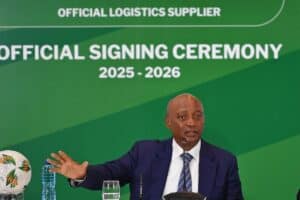Failing to fix Eskom means failing as a country, writes Mamokgethi Molopyane.

As far as the governing African National Congress (ANC) is concerned, the electricity crisis is manageable and under control.
Yet if you were to ask who is in charge of planning for, developing, and keeping the lights on – by ensuring the integrity of South Africa’s power system – the party would point to those it has deployed in government, who, as we know, regularly contradict each other.
SA’s electricity crisis
It is hard to talk about a functioning, reliable, resilient and stable electric power system in a country where mismanagement of public goods and poor maintenance is tolerated.
It is hard to talk about accountability in a country where no single politician implicated in corrupt practices and activities is punished for those crimes.
For basic services to be delivered, destructive and violent protests by communities is often the only language that politicians respond to quickly.
A lesson wrought from the foregone scenario is that crises and lack of services demand more action from government.
We want action
The crisis in South Africa today is worsened by electricity supply that is unreliable and unstable, such that increasingly regular load shedding must occur in order for the power system to be maintained or repaired.
One would think the demand for action to come from above on the electricity crisis would give rise to greater government effort to resolve the Eskom nightmare. Yet the opposite is true.
André de Ruyter resigned as the CEO of Eskom a few days before the ANC’s 55th National Congress, and what happened? Nothing.
The president of the republic was too preoccupied with party politics and his quest to be re-elected to act.
Moneyweb editor Ryk van Niekerk wrote a column in which he correctly compares President Cyril Ramaphosa’s inaction on Eskom with the Zuma administration and its dogged determination to get rid of the Scorpions unit.
Perhaps it has now become clearer to the reader that it is impossible to separate the leader from the party.
Fixing Eskom
De Ruyter’s tenure at Eskom was characterised by ministers who contradicted the CEO in public, including Minister of Mineral Resources and Energy Gwede Mantashe, who accused the entity of agitating to overthrow the government.
The process through which the Eskom crisis has emerged, intensified and been mismanaged contains internal and external factors fit for a spy thriller.
Ideas of clear strategy to fix the power producer are cast into the bin the minute they are put forth.
In whose vested interest is it to keep Eskom in a state of perpetual crisis that could lead to collapse?
A common perception is that there is no political will to fix Eskom. I disagree. The political will is there, but it is hindered by embedded interests – including policy choices attentive to markets, competition, and at times divergent private, public, local and national interests.
To me it seems politicians are unable to comprehend that managing an electric power system cannot be a piecemeal process driven by different strategies under different departments and operating differently in various parts of the country.
It is clear that:
- Eskom, if it is to be fixed and keep the power on, must be a performance indicator for President Ramaphosa his executive; and
- Electricity generation and subsequent use must be an indicator of the country’s economic activity.
On the latter, there is empirical evidence of the correlation of electricity use and growth rates in real gross domestic product (GDP).
The US Energy Information Administration, for example, has found that electricity usage tends to move with other economic statistics such as employment, productivity and sales of goods.
There’s today, and there’s tomorrow …
Here in South Africa, we know very well the effects of load shedding on the productivity of individuals, the provision of services, and the production of goods.
We feel the impact in the moment. Longer term, the commuting time when traffic lights are out and the downtime many companies face during load shedding influences how they structure – or restructure – their operations, often resulting in job losses.
Perhaps being held accountable for electricity generation and keeping the lights on, and using this as an economic indicator tied to GDP, will show the centrality of electric power to national economic performance.
Power failure
At the moment Eskom cannot even produce enough stable electricity for 48 hours without needing to shut down.
It is imperative that (if not known by now) leaders be made to understand how demand for electricity will continue to grow and so will illegal connections that syphon power from the grid. Unless government meets energy demands, the country’s power supply will continue to spiral.
Importantly, those at the helm of government must be made to understand that the economy, politics, the regulatory environment, changes in technology, societal expectations of electric power, and patterns of electricity consumption are tied – and that failing to fix Eskom means failing as a country.
Mamokgethi Molopyane is a mining and labour analyst. She’s also the founder of Creative Voodoo Consulting. She’s done work in the biofuel, forestry, mining, energy and space industries.
This article first appeared on Moneyweb and was republished with permission. Read the original article here.
Support Local Journalism
Add The Citizen as a Preferred Source on Google and follow us on Google News to see more of our trusted reporting in Google News and Top Stories.






